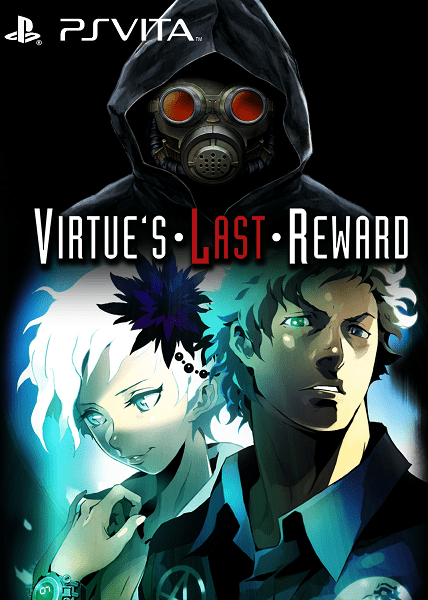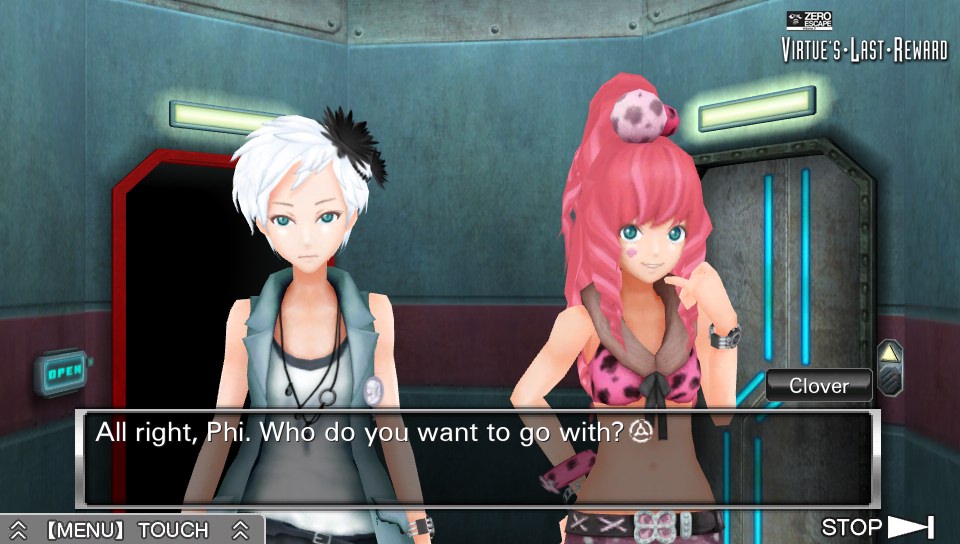
Virtue's Last Reward – A poor ending ruins an otherwise fantastic game
***
Reviewed April 16, 2016 on PlayStation Vita
Leave a comment on Giant Bomb
Virtue's Last Reward is a difficult game to review - for the first 35 hours of my playthrough, I was enraptured, with the plot providing a sustained level of intrigue that is difficult to maintain for such a long period, and the puzzles being immensely satisfying to solve. Unfortunately, the final five hours of the game left me with such a bitter taste in my mouth that I felt almost betrayed by the game. Setting up such an intricate story and leaving the player wanting answers to so many questions, only to punt the explanations to the sequel was a complete let-down.
Since finishing the game a few days ago, I have hardly stopped thinking about it. Normally, this would be a good sign, but all I've discovered in those few days are new ways that the ending to VLR fails to satisfy. This review may seem a little vague, but my issues with the game are so tightly connected to the late-game plot that giving concrete examples is nearly impossible without spoiling the entire game.
Players of 999: Nine Hours, Nine Persons, Nine Doors will be immediately familiar with the structure of the game. The main thrust of the story takes place in visual novel sections, with the gameplay being confined to "escape" sequences where the puzzle must solve a series of puzzles in a single room in order to move on. Your choices between the escape sequences dictate which rooms you end up in, and ultimately which ending you receive. As with 999, you need to see a number of these endings before being able to reach the True End.
On the whole, these escape puzzles are a step-up from 999. There is a clear logic to the majority of them, and it feels genuinely satisfying to work out the solution (in 999, I felt a few times that I was randomly exploring until I stumbled on a key item or hint; that was never the case in VLR). A nice quality-of-life feature is that items are usually removed from your inventory when you have done all you need to do with them, which both prevents the inventory screen from being coming cumbersome and provides a subtle hint to try something else. A somewhat weird choice in these segments is the inclusion of hidden files - by solving a secondary puzzle in the room, the player unlocks a number of files that can be read at any point. These quite often very heavily hinted at future events, and lessened the reveal when it eventually happens.
Likewise, the visual novel sections are well-written, and the majority of the characters are interesting. I initially had my doubts about the 3D character models, but these were gone after the first hour or so and didn't bother me beyond that. Playing with the Japanese audio (the only option in the European releases) revealed a few interesting localisation choices (for example, Luna and Tenmyouji were referred to as simply "Luna-kun" and "Tenmyouji-san" by Zero, the primary antagonist, but this was localised as "Moony" and "Tenmyoldy") which occasionally felt odd as you were hearing one thing but reading another. Ultimately though, the localisation of the game was well done.
Mechanically, the game is solid. Playing on the Vita, I occasionally missed the stylus from the 3DS for interacting with smaller puzzle elements, but that was a minor issue. The addition of a flowchart, showing which story branches you have explored so far, is a welcome addition, as if you wish to reveal the game's True End you will need to reach almost every other ending in the game (of which there are over 20). This may seem daunting, but from the flowchart you can jump to any point in the story you have already seen, so you never need to repeat the same section. I have read reports that a save corruption bug exists in a certain room, but I did not encounter it during my playthrough, and it is relatively easy to avoid (save only during the novel sequences, not during the escape sequences).
Unfortunately, it is in the narrative that this game falls apart. For the first 35 or so hours, I had only minor issues with the plot (mainly related to how easy to is to confuse different story branches, though this makes sense giving the revelations later in the story) and stayed up far later than one should to continue playing. The way seemingly irrelevant facts start to connect, and how lines that seem a little odd at the time suddenly make sense later in the story, is masterfully done. It is a shame, however, that just as you can start to see an overall explanation emerging the game decides to throw all of that away. The last five hours of the game feel reminiscent of the ending of Metal Gear Solid 2 - new information is thrown at you at an alarming, unexpected rate, and the story suddenly feels very back-loaded.
However, if you take the time to listen the MGS2 ending, it largely makes sense, and actually explains what is going on. The ending to VLR doesn't - new twists are revealed almost constantly for pretty much no reason, the game takes no time to explain the majority of the questions you will already have going into the ending, and eventually the whole thing collapses under its own weight and you realise you are never going to get a satisfying explanation of the mystery that the rest of the game has so carefully built.
To cap it all of off, the final ending that unlocks is merely a giant sequel hook, and just leaves you feeling "You want any of that explained? Maybe you should play Zero Escape 3....". In this segment, you actually end up playing as a character referred to as '?', and other characters straight up say that they cannot explain the questions you have to you, which I think symbolises the last five hours of the game pretty well). After the extremely tight and well-crafted ending of 999 (which I played immediately prior to this), VLR was a major let down (999 has its dumb cliffhanger, but that was a throwaway moment after the main plot was resolved).
I would strongly recommended that you play 999 before (or perhaps instead of...) playing VLR. Despite having flaws of its own, it has a much more satisfying story, and many of the bigger reveals in VLR will fall somewhat flat due to the narrative connections between the two games.
